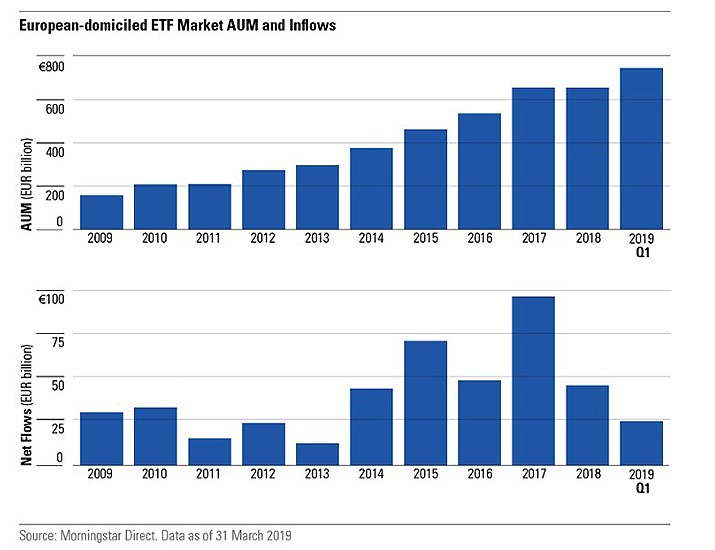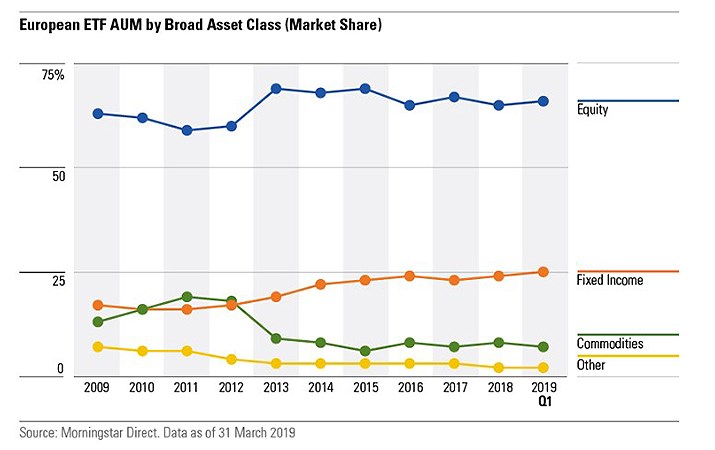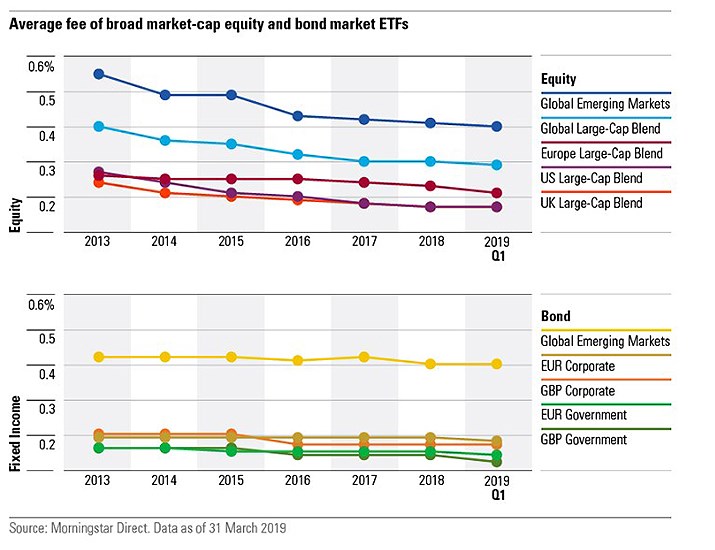
With the long-term trend toward low-cost investment continuing to favour passive solutions, the outlook for the European exchange-traded fund industry remains rosy.
The latest edition of Morningstar’s “A Guided Tour of the European ETF Marketplace” speaks to these developments in European ETFs. We explore four key takeaways:
European ETFs Could Reach €2 Trillion by 2024
The European ETF marketplace has grown at a rapid clip over the past decade, soaring to about €760 billion of assets under management by the end of first-quarter 2019 - more than a fourfold increase from €160 billion at the end of 2009 (as shown on the chart below).
With consistently positive, upward-trending flows, assets in European ETFs are well on course to hit €1 trillion by 2020. And at this rate of growth, we anticipate they could reach €2 trillion as soon as 2024.

Equities still dominate the ETF marketplace, but fixed-income ETFs gain ground
When analysed for AUM distribution by broad asset class, we see that the European ETF marketplace remains biased toward equities: as shown below, equity ETFs accounted for about two thirds of total AUM at the end of first-quarter 2019.
Though they represent fewer assets overall, fixed-income ETFs have seen strong growth, more than quadrupling over the trailing five years.
Improvements in bond index construction are one driver of this area’s growth. Additionally, market-makers have found ways to overcome technical barriers that previously inhibited real-time single pricing for over-the-counter assets.

3 Areas of Innovation in the ETF Marketplace
As the mainstream space becomes increasingly crowded, many ETF providers seek opportunities for product development that allow them to differentiate themselves and/or maintain margins. A few popular areas of product development include:
- Strategic beta. One of the key ETF product development battlegrounds of recent years, most new launches now focus on multifactor equity strategies. Many ETF providers are marketing strategic-beta products as a way to improve the risk/return profile of a broad market-cap index. Diversification across factors can help curb the impact of long periods of underperformance commonly experienced by single-factor strategies.
- Thematic. Thematic funds attempt to profit from long-term macro or structural trends such as demographic shifts, technological advances, and environmental changes. Technological ETFs in particular have caught investors’ attention, with launches covering artificial intelligence, cloud computing, digital security, and e-commerce. AUM growth in this area has been driven by the success of two robotics and automation ETFs (iShares Automation & Robotics ETF and L&G ROBO Global Robotics and Automation ETF).
- ESG. Sustainable investing has outgrown its niche to become one of the most fiercely contested areas of product development. Many providers now offer a core set of ESG-focused ETFs that take varying approaches, including ESG integration and hard exclusions. ESG ETFs saw a banner year in 2018: Assets grew by 50% to EUR 9.95 billion, and 36 new products came to market, as compared to 15 in 2017.
Ongoing Fee Pressure for European ETFs
The downward pressure on ETF fees continues to shape the market, both for mainstream exposures and beyond.
Over the past two years, we have seen fee competition intensify across the ETF space, as average ongoing charges have fallen across the main equity and bond categories (as shown on the chart below). This movement may be owed to a growing sense that the development and management requirements of these products do not justify substantially higher fees.

In particular, the field of sustainable ETFs has seen increased fee competition. 2018 saw the launch of several aggressively priced ETFs (from iShares, Xtrackers, and Legal & General Investment Management), which means that investors can now buy a range of sustainable portfolio building blocks without having to pay a premium.
Using the US market as a barometer, we can speculate that European ETF fees still have some way to fall.
This article originally appeared on the Morningstar blog





























